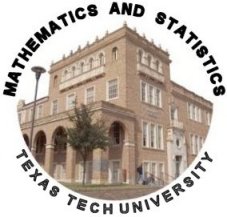Workshops for Students
Mathematical clocks, [MATH 111].
Dr. Roger W. Barnard
Abstract: We will discuss the history and current use of mathematical
clocks and then have the students create their own mathematical clocks in small groups.
Time scales fly when you're having fun, [MATH 110].
Dr. Raegan Higgins
Abstract: This will be a hands-on down-to-earth introduction to difference equations
and time scales. We will introduce a variety of basic sequences and see how to
establish recursive relationships. In some instances, we will see how to use these
recursive relationships to establish explicit formulas.
Telling Ham from Spam, [MATH 113].
Dr. Victoria Howle and Dr. Lourdes Juan
Abstract: Everybody knows that spam is unsolicited bulk email.
Email that is not spam is referred to, among the antispam software
developers, as ham. At the workshop we will introduce the students
to basic spam filtering through machine learning tools.
Mathematical Modeling of Biological Populations, [MATH 108].
Dr. Sophia Jang
Abstract: Mathematics provides important and useful tools for studying biological
problems. We will review some classical population models of predator-prey interactions
and of exploit competition. We will use computer simulations to explore the cyclic behavior
of a predator-prey relation, a kind of fox-rabbit phenomenon. We will then investigate
competition outcomes between two competing populations to see how vital parameters
determine selection.
Modern Windtalkers: On Codes, Coding, and Decoding, [MATH 114].
Dr. Mara D. Neusel
From Wikipedia:
"Code talkers were people who used obscure languages as a means of secret communication during wartime. The term is now usually associated with the United States soldiers during the world wars who used their knowledge of Native-American languages as a basis to transmit coded messages. In particular there were approximately 400-500 Native Americans in the United States Marine Corps whose primary job was the transmission of secret tactical messages. Code talkers transmitted these messages over military telephone or radio communications nets using formal or informally developed codes built upon their native languages. Their service improved communications in terms of speed of encryption at both ends in front line operations during World War II."
This workshop is on coding theory: How do we encode a message? How do we decode messages? What is a "good" code? Why are the codes used during the world wars no longer acceptable? How do the modern codes work? -- And we will have a lot of fun!
Let's have fun with paper plates, [MATH 109].
Dr. Lih-Ing Roeger and Dr. Giorgio Bornia
Abstract: Paper plates are not for picnic only. You can have fun with them too. I will show
you how to form a pyramid using only one paper plate. Spheres can be made using four
paper plates and a few hair clips or scotch tapes. Students who attend this workshop will
also put together a fancy sphere formed by 20 paper plates. No advanced math skills are
needed in this workshop. You just need to have an open mind and great imagination. Come
and have fun.
Real Uses of Imaginary Numbers, [MATH 112].
Dr. Brock Williams
Abstract: We will see why imaginary numbers are really important and what they can be
used for. In particular, we'll explore the connections between complex numbers and
geometry and solve real-world problems in brain mapping and image recognition.
|

